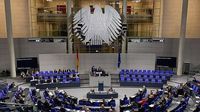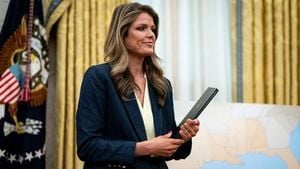Germany’s outgoing parliament took a decisive step on March 21, 2025, rushing through a revision of its constitution and a massive spending package aimed at facilitating unlimited military funding. This vote initiated the largest armaments program in Germany since the establishment of the Federal Republic in 1949, with half a trillion euros allocated for vague categories such as "infrastructure and climate neutrality."
In a rather swift move, the conservative Christian Democratic Union (CDU) and the Social Democratic Party (SPD) secured support from the Greens to gather the necessary two-thirds parliamentary majority to amend Germany’s "Basic Law." This unprecedented alliance became critical to avoid reliance on the far-right Alternative for Germany (AfD), which had gained additional seats—69, to be exact—in the upcoming parliament convocation set for March 25.
Additionally, the amendments additionally exempt increased military spending from the Schuldenbremse, Germany's stringent anti-debt law enacted in 2009. The urgency behind the changes stemmed from Germany's current realities; following the sanctions imposed on Russia in 2022 and an economy slumping under two years of recession, the government stares down a forecasted economic growth of merely 0.2% for 2025—an estimate now appearing increasingly optimistic amid rising US tariffs.
Today, the new changes mean that Germany's military budget has no upper limit and that any spending above 1% of GDP will be exempt from the country’s borrowing restrictions. Such governance echoes the notorious vote of 1914 when the Social Democrats colluded with centrist parties to fund war efforts against France and Russia—only this time, the German government has unfettered authority to borrow without limit.
The amendments are just one part of a broader strategy, one that the incoming CDU-SPD coalition aims to champion. Accompanying the military funding overhaul is a special funding package designated for infrastructure and climate initiatives, which will be financed through an additional 500 billion euros over 12 years—though the specifics remain curiously undefined. Nevertheless, this initiative has the dual purpose of placating various labor sectors currently protesting and expanding infrastructure to support military operations alike.
This militarization strategy is welcomed by many in Berlin and Brussels. Polish Prime Minister Donald Tusk stated emphatically on March 6: "Europe must join this arms race and win it… I am convinced that Russia will lose this arms race – just as the Soviet Union lost a similar arms race 40 years ago." Leading the charge for increased military cooperation within the European Union, Tusk’s comments resonate with a heightened sense of urgency as Europe braces for greater tensions.
Moreover, EU Commission President Ursula von der Leyen has reiterated the need for member states to prioritize once-overlooked European military suppliers. Her announcement of a new "National Escape Clause" allows for bending previously inflexible fiscal rules if military spending is deemed the purpose. In this newly defined governmental landscape, analysts report that stock prices for armament companies like Rheinmetall and Leonardo benefitted remarkably from the EU’s announcement, with projections indicating the EU’s "ReArm Europe" plan is set to be valued at about 800 billion euros.
As military investments keep rising, so do employment figures in the industry. In 2023, around 581,000 people were employed across the EU’s armaments sectors, a startling increase of approximately 15% since 2021—all indicators of an industry rebounding and responding to the shifts in policy.
The ramifications of this militarization extend beyond the EU. Companies like Volkswagen, which once turned away from military vehicle manufacturing post-World War II, have now expressed openness to revisiting military production as a viable option. Germany has seemingly transitioned from its neoliberal policies toward wartime Keynesianism. Dutch Admiral Rob Bauer captured this paradigm shift succinctly, stating, "The military may win battles, but the economy wins wars," signaling an essential pivot in the current political and economic landscape.
This newfound affinity for militarization raises inevitable concerns and discussions around the prospect of mandatory conscription, with Germany’s defense minister aiming for readiness for armed conflicts by 2029. As Ursula von der Leyen pointedly remarked during the amendment discussions, "If Europe wants to avoid war, Europe must get ready for war." Her sentiment echoed Chancellor Theobald von Bethmann Hollweg’s remarks from 1914, as he responded to rising tensions with a similar insistence on the necessity to mobilize military readiness against France and Russia.
Critics caution that such a dramatic policy shift could ignite a backlash from Germans who are historically wary of militarization and authoritarian tendencies. As the outgoing parliament hastily solidifies this new framework, Germany stands at a crossroads, both economically and militarily—laying the groundwork for a bold new chapter in its defense policy.





